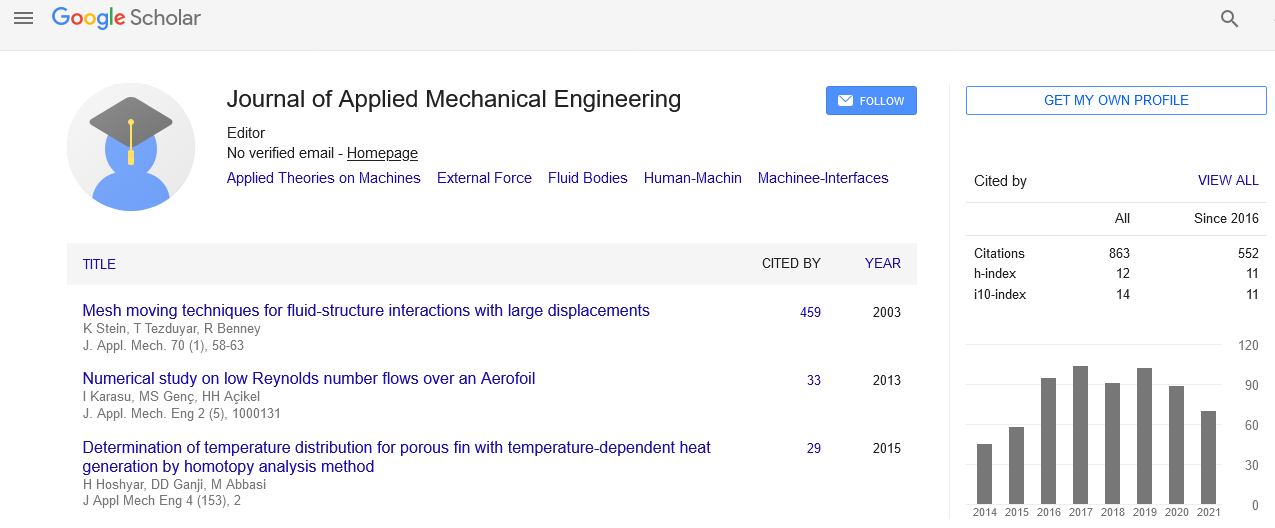Indexed In
- Genamics JournalSeek
- JournalTOCs
- CiteFactor
- RefSeek
- Hamdard University
- EBSCO A-Z
- OCLC- WorldCat
- Publons
- Google Scholar
Useful Links
Share This Page
Journal Flyer

Open Access Journals
- Agri and Aquaculture
- Biochemistry
- Bioinformatics & Systems Biology
- Business & Management
- Chemistry
- Clinical Sciences
- Engineering
- Food & Nutrition
- General Science
- Genetics & Molecular Biology
- Immunology & Microbiology
- Medical Sciences
- Neuroscience & Psychology
- Nursing & Health Care
- Pharmaceutical Sciences
New design of model reference adaptive control systems
International Conference and Exhibition on Mechanical & Aerospace Engineering
September 30-October 02, 2013 Hilton San Antonio Airport, TX, USA
M. P. R. V. Rao
Scientific Tracks Abstracts: J Appl Mech Eng
Abstract:
When a plant model structure is known but its parameters are unknown, the process of developing a control scheme naturally becomes complicated. In general, it has been a common experience to find that more complex is the plant model: the more complex is the design of a suitable controller scheme Adapting/adjusting the controller parameters for such cases (where plant parameters were not accurately known), is known as ?Adaptive Control?. It was developed during 1960s. In MRAC, a reference model is apriority chosen so that it describes the desired response of the plant controller combination; this choice is made by the designer, based on experience. The plant output is compared with the reference model output; the difference between them, called a system output is used to adjust the controller parameters such a way until this very error signal is driven to zero. In this MRAC, two features play crucial role: 1) stability of the overall system, including the adaptive mechanism - in the sense that all signals in the entire system remain bounded; and 2) the plant output response meeting the reference model output response, with minimum error; that is, the system output error converging to zero. Consequently, after an MRAC scheme is designed, the entire system is simulated to check whether the above two feature are satisfied. A typical adaptive controller scheme has a mechanism in an additional loop (over and above the ordinary feedback loop) for adjusting/adapting the controller parameters. The equations, which describe how these controller parameters need to be adjusted, are called ?adaptive laws?. Since the overall system stability is the primary requirement, adaptive control schemes and adaptive laws have been developed based on Lyapunov stability theory, historically since the 1960s The choice of adaptive gains has been a problem and many times chosen by trial and error basis. In this paper, the adaptive gains are chosen based on the integral of the square of the error signal. In the new laws presented in this paper are able to help improve the overall system stability and to offer optimal tuning for controller parameters, but also they are able to provide better dynamic performance and faster decay of system output error signal, with less oscillations while going to zero.
Biography :
M. P. R. V. Rao has completed his Ph.D. at the age of 30 years from Indian Institute of Technology, Bombay, India and postdoctoral study from Queen?s University of Belfast. He served as the course director and staff of the School of Engineering of the University of Ulster at Jordanstown, Northern Ireland, U. K. He has published more than 30 papers in reputed conferences and journals and serving as an editorial board member of repute.

